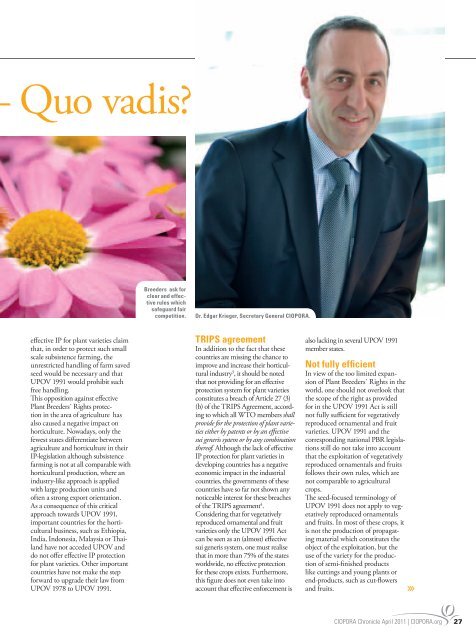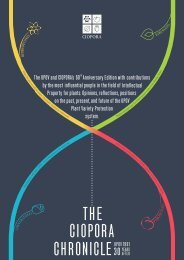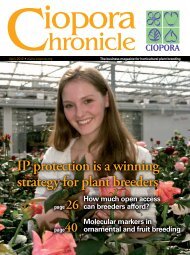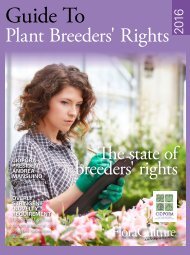2011 CIOPORA Chronicle - the 50th Anniversary Edition
CIOPORA annual magazine on Intellectual Property protection for plant innovations 2011. The magazine was produced in cooperation with FloraCulture International. Read in the 2011 CIOPORA Chronicle edition: - CIOPORA plays vital role in supporting the industry - PVR litigation on the rise - Plant Breeders´Right. Quo vadis? - China deploys national strategy for IPR - CIOPORA helps IP owners protect their rose varieties and much more...
CIOPORA annual magazine on Intellectual Property protection for plant innovations 2011. The magazine was produced in cooperation with FloraCulture International.
Read in the 2011 CIOPORA Chronicle edition:
- CIOPORA plays vital role in supporting the industry
- PVR litigation on the rise
- Plant Breeders´Right. Quo vadis?
- China deploys national strategy for IPR
- CIOPORA helps IP owners protect their rose varieties
and much more...
You also want an ePaper? Increase the reach of your titles
YUMPU automatically turns print PDFs into web optimized ePapers that Google loves.
Quo vadis?<br />
Breeders ask for<br />
clear and effective<br />
rules which<br />
safeguard fair<br />
competition.<br />
Dr. Edgar Krieger, Secretary General <strong>CIOPORA</strong>.<br />
effective IP for plant varieties claim<br />
that, in order to protect such small<br />
scale subsistence farming, <strong>the</strong><br />
unrestricted handling of farm saved<br />
seed would be necessary and that<br />
UPOV 1991 would prohibit such<br />
free handling.<br />
This opposition against effective<br />
Plant Breeders´ Rights protection<br />
in <strong>the</strong> area of agriculture has<br />
also caused a negative impact on<br />
horticulture. Nowadays, only <strong>the</strong><br />
fewest states differentiate between<br />
agriculture and horticulture in <strong>the</strong>ir<br />
IP-legislation although subsistence<br />
farming is not at all comparable with<br />
horticultural production, where an<br />
industry-like approach is applied<br />
with large production units and<br />
often a strong export orientation.<br />
As a consequence of this critical<br />
approach towards UPOV 1991,<br />
important countries for <strong>the</strong> horticultural<br />
business, such as Ethiopia,<br />
India, Indonesia, Malaysia or Thailand<br />
have not acceded UPOV and<br />
do not offer effective IP protection<br />
for plant varieties. O<strong>the</strong>r important<br />
countries have not make <strong>the</strong> step<br />
forward to upgrade <strong>the</strong>ir law from<br />
UPOV 1978 to UPOV 1991.<br />
TRIPS agreement<br />
In addition to <strong>the</strong> fact that <strong>the</strong>se<br />
countries are missing <strong>the</strong> chance to<br />
improve and increase <strong>the</strong>ir horticultural<br />
industry 3 , it should be noted<br />
that not providing for an effective<br />
protection system for plant varieties<br />
constitutes a breach of Article 27 (3)<br />
(b) of <strong>the</strong> TRIPS Agreement, according<br />
to which all WTO members shall<br />
provide for <strong>the</strong> protection of plant varieties<br />
ei<strong>the</strong>r by patents or by an effective<br />
sui generis system or by any combination<br />
<strong>the</strong>reof. Although <strong>the</strong> lack of effective<br />
IP protection for plant varieties in<br />
developing countries has a negative<br />
economic impact in <strong>the</strong> industrial<br />
countries, <strong>the</strong> governments of <strong>the</strong>se<br />
countries have so far not shown any<br />
noticeable interest for <strong>the</strong>se breaches<br />
of <strong>the</strong> TRIPS agreement 4 .<br />
Considering that for vegetatively<br />
reproduced ornamental and fruit<br />
varieties only <strong>the</strong> UPOV 1991 Act<br />
can be seen as an (almost) effective<br />
sui generis system, one must realise<br />
that in more than 75% of <strong>the</strong> states<br />
worldwide, no effective protection<br />
for <strong>the</strong>se crops exists. Fur<strong>the</strong>rmore,<br />
this figure does not even take into<br />
account that effective enforcement is<br />
also lacking in several UPOV 1991<br />
member states.<br />
Not fully efficient<br />
In view of <strong>the</strong> too limited expansion<br />
of Plant Breeders´ Rights in <strong>the</strong><br />
world, one should not overlook that<br />
<strong>the</strong> scope of <strong>the</strong> right as provided<br />
for in <strong>the</strong> UPOV 1991 Act is still<br />
not fully sufficient for vegetatively<br />
reproduced ornamental and fruit<br />
varieties. UPOV 1991 and <strong>the</strong><br />
corresponding national PBR legislations<br />
still do not take into account<br />
that <strong>the</strong> exploitation of vegetatively<br />
reproduced ornamentals and fruits<br />
follows <strong>the</strong>ir own rules, which are<br />
not comparable to agricultural<br />
crops.<br />
The seed-focused terminology of<br />
UPOV 1991 does not apply to vegetatively<br />
reproduced ornamentals<br />
and fruits. In most of <strong>the</strong>se crops, it<br />
is not <strong>the</strong> production of propagating<br />
material which constitutes <strong>the</strong><br />
object of <strong>the</strong> exploitation, but <strong>the</strong><br />
use of <strong>the</strong> variety for <strong>the</strong> production<br />
of semi-finished products<br />
like cuttings and young plants or<br />
end-products, such as cut-flowers<br />
and fruits.<br />
>>><br />
<strong>CIOPORA</strong> <strong>Chronicle</strong> April <strong>2011</strong> | <strong>CIOPORA</strong>.org 27









